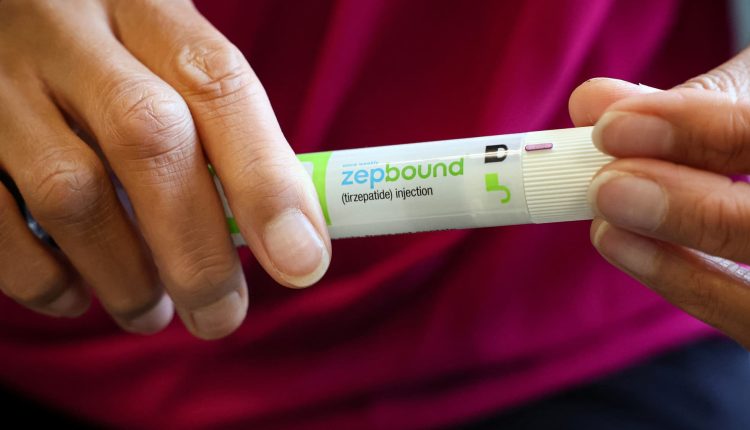An injection pen of Zepbound, Eli Lilly’s weight loss drug, is displayed in New York City, U.S., December 11, 2023.
Brendan McDermid | Reuters
Eli Lilly on Tuesday reported fourth-quarter revenue and adjusted earnings that topped expectations on the strong launch of its new weight loss drug, Zepbound, and higher prices for its blockbuster diabetes treatment, Mounjaro.
Zepbound, which won approval from U.S. regulators in early November, raked in $175.8 million in sales for the fourth quarter.
The quarterly results are the first to include sales of Zepbound, which some analysts say could post more than a billion dollars in sales in its first year on the market and eventually, become the biggest drug of all time.
Shares of Eli Lilly were up about 5% in premarket trading Tuesday.
Here’s what Eli Lilly reported for the fourth quarter compared with what Wall Street was expecting, based on a survey of analysts by LSEG, formerly known as Refinitiv:
- Earnings per share: $2.49 adjusted vs. $2.22 expected
- Revenue: $9.35 billion vs. $8.93 billion expected
Eli Lilly posted net income of $2.19 billion, or $2.42 a share, for the fourth quarter. That compares with a profit of $1.94 billion, or $2.14 a share, a year earlier.
Excluding one-time items associated with the value of intangible assets, among other adjustments, the company posted a per-share profit of $2.49 for the fourth quarter of 2023.
The pharmaceutical giant booked fourth-quarter revenue of $9.35 billion, up 28% from the same period a year ago.
Eli Lilly also issued its full-year forecast for 2024, which was generally in line with expectations.
The company expects full-year adjusted earnings of $12.20 to $12.70 per share. Eli Lilly also forecast 2024 revenue of $40.4 billion to $41.6 billion.
Analysts surveyed by LSEG expected full-year adjusted earnings of $12.43 per share and sales of $39.38 billion.
Shares of Eli Lilly jumped almost 60% last year as weight loss drugs skyrocketed in popularity despite hefty price tags, mixed insurance coverage and a handful of unpleasant side effects. With a market cap of roughly $673 billion, Eli Lilly is the largest pharmaceutical company based in the U.S.
Mounjaro sees higher demand, prices
Higher prices for older drugs, particularly Mounjaro, helped drive up Eli Lilly’s revenue, the company said. Mounjaro booked $2.21 billion in sales for the fourth quarter, up from just $279.2 million in the same period a year ago.
Analysts had expected the drug to bring in $1.73 billion in worldwide sales, according to estimates compiled by FactSet.
That increase reflects increased demand but also “higher realized prices” in the U.S. due to decreased use of Eli Lilly’s savings card programs as access to the drug continued to expand during the quarter, the company said. The savings card programs aim to help lower the out-of-pocket costs for drugs like Mounjaro for patients.
Revenue growth was also driven by sales of Eli Lilly’s breast cancer pill Verzenio, which rose 42% to $1.15 billion for the quarter due to increased demand and higher prices.
Those results came in under analysts’ expectations, however, which called for $1.18 billion in sales for the period.
Sales of Jardiance, a tablet that lowers blood sugar in Type 2 diabetes patients, climbed 30% to $798.1 million for the fourth quarter. Analysts had expected $771.8 million in sales from Jardiance.
Jardiance, which Eli Lilly shares with Boehringer Ingelheim, is among the first 10 drugs selected to face price negotiations with the federal Medicare program. Those price talks heated up last week after Medicare sent its initial price offers for each drug to the manufacturers.
Meanwhile, Eli Lilly said higher prices were offset by lower prices of its other diabetes medicine Trulicity and insulin product Humalog.
Trulicity reported $1.67 billion in revenue, down 14% from the same period a year ago. Analysts had expected Trulicity to rake in $1.77 billion in sales for the quarter.
Humalog saw $366.6 million in revenue for the quarter, down 33% from the year-ago period. Analysts had expected the medicine to book $438 million in sales, according to FactSet.
That decrease isn’t a surprise: Last year, Eli Lilly said it would cut prices of Humalog and another commonly prescribed insulin by 70% and cap monthly out-of-pocket costs at $35 at certain retail pharmacies for people who have private insurance starting May 1, 2023.
Eli Lilly will hold an earnings call with investors at 10:00 a.m. ET on Tuesday.
Executives will likely be asked about whether the company has made more progress in addressing the supply issues plaguing its weight loss and diabetes drugs.
There may also be questions related to the timing of the FDA’s decision on Eli Lilly’s experimental Alzheimer’s drug, donanemab, which significantly slowed the progression of the memory-robbing disease in patients at the early stages of it.
The company did not mention the drug in its earnings release.
This is breaking news. Please check back for updates.
Read the full article here

